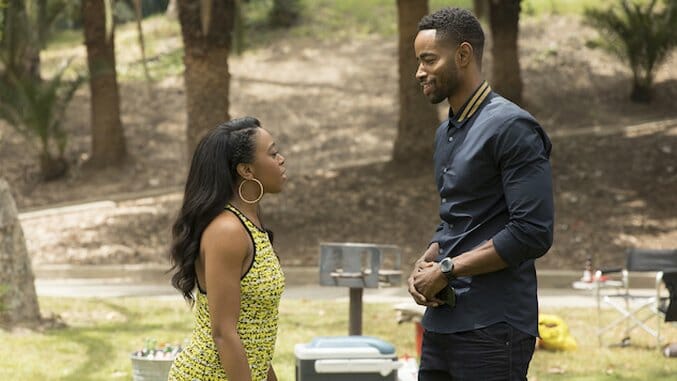Insecure Shines a Light on Relationships That Are “Hella Open”
(Episode 2.03)
Photo: Justina Mintz/courtesy of HBO
Last week, I wrote about how Tasha (Dominique Perry) might be a much more complex character than she appears, and how many of our assessments of her as a desperate homewrecker were rooted in the projection of our own insecurities and trauma.
In the latest episode, my theory proved precient, though the reality is slightly more complex. When Lawrence (Jay Ellis) ditches her after showing up at her family’s cookout, belatedly explaining that he isn’t looking for anything serious, Tasha confirms that she wasn’t just ignorantly begging for his attention the whole time they’ve been dating. “You don’t think I knew what this was?” she asks. “I knew it wasn’t nothing serious.”
Tasha’s issue was not with the fact that Lawrence didn’t want to move full speed ahead with the relationship. Her issue was with his dishonesty, and with him pretending that he wanted something more when he clearly did not. “You [are] a fuck nigga who thinks he’s a good dude,” she observes.
As I pointed out, acknowledging Tasha’s agency in this situation shines a light on the validity of queer(ed) relationships, particularly those that might be more open than is traditional. We know that Lawrence is not ready to settle down, and if Tasha knows this too and still chooses to go with the flow, perhaps settling down isn’t her biggest priority, and that’s perfectly fine. Tasha should be given space for her job, schooling and family to come before a man, because men aren’t the end-all, be-all. That doesn’t mean she doesn’t think a man would be great, it just means that not all of us require absolute monogamy, especially not immediately upon meeting someone we’re interested in.
Holding space for these possibilities, for Tasha and others, is important, but the problem is that even relationships that are more open than is traditionally accepted still rely on basic honesty and healthy communication—which fuck boys just aren’t equipped to give. A common misunderstanding of the function of open relationships is that they might somehow fix issues of untrustworthiness and lack of dependability. For open relationships to work, however, they need boundaries that all parties consent to.
In the case of Tasha and Lawrence, not being ready for something serious was a line she was willing to cross, but Lawrence’s issue wasn’t that Tasha wanted something too serious. His issue is that he is narcissistic and manipulative, and no open relationship can fix those traits.
Tasha was willing and able to do what Lawrence claimed to want, and for that she should be encouraged and applauded, not read as desperate. But what Lawrence claims to want isn’t truly what he wants. He doesn’t just want to take things slow, because they were already doing that. Rather than do the work of figuring out what it is he does want, though, he hangs Tasha out to dry over and over again.
Though they should be legitimate options for the people who are willing to navigate them, open relationships, or those that aren’t traditionally monogamous, take as much work (if not more) than any other types of relationships. They require honesty, trust and consent, and for the people within them to know that their actions are bigger than just themselves. As Tasha points out, the people within non-traditional relationships still have to be “good” people, and being a part of them isn’t an indication of one’s lack of scruples or self-respect.
But you can be a fuck boy in any relationship, including friendships, and no amount of other people agreeing to “take it slow” with you can fix that.
Hari Ziyad is an artist, writer and the editor-in-chief of the literary and media publication RaceBaitR. They are also Deputy Editor for Black Youth Project, an Assistant Editor for Vinyl Poetry & Prose, and writer for AFROPUNK. You can find them on Twitter @hariziyad.







































